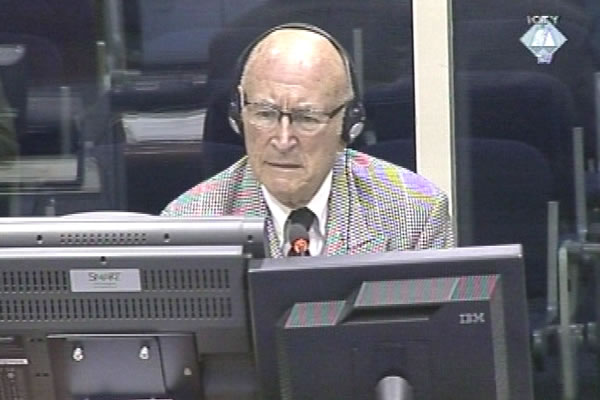Home
HADZIC WAS ‘BRAVE’, BABIC WAS ‘HEADSTRONG’ AS THE LOG REVOLUTION UNFOLDED
Vojislav Vukcevic, founder of the Serbian Democratic Party in Baranja, testified that Hadzic was brave enough to ‘express his displeasure’ with Slobodan Milosevic. Vukcevic also spoke about the decisions made by the ‘headstrong Babic, the ‘spontaneous plebiscite’ and the ‘logs’ that for a while forced both Serbs and Croats to the negotiating table
 Vojislav Vukcevic, defence witness at Goran Hadzic trial
Vojislav Vukcevic, defence witness at Goran Hadzic trial Vojislav Vukicevic, founder of the Serbian Democratic Party in Baranja who later became the minister for the Diaspora in the Serbian government, began his testimony just before the end of the hearing. In the first half-hour, Vukcevic regaled the court with a number of details about his activities at the beginning of the conflict in Croatia.
Vukcevic’s testimony is based on the statement he gave to Goran Hadzic’s defense. In line with the Trial Chamber’s order, the summary of the statement wasn’t read out in court. At the beginning of his statement Vukcevic talked about the introduction of the multi-party system in Yugoslavia. The system replaced the League of Communists, the political party that had been wandering about like a ‘sightless man’, as the witness put it. In Vukcevic’s opinion, the ‘indecision and vacillation’ of the leadership of the League of Communists helped to usher in the ethnic-based and nationalist parties that attracted Croats and Serbs.
Vukcevic described the Croatian Democratic Union as a ‘nationalist party’ whose members treated everybody and ‘Serbs in particular’ with ‘intolerance and hatred’. This made Serbs ‘upset and afraid’. According to Vukcevic, the members of the Serbian Democratic Party ‘liked their own people, but didn’t hate the others’.
The witness recounted that he met Hadzic through Hadzic’s then wife: he was her teacher at the law school. Hadzic and Vukcevic met at an SDS assembly in Vukovar in June 1990. Vukcevic then suggested to Jovan Raskovic, the party president, to establish a party branch for Baranja. Vukcevic described Hadzic as a man who had the ‘courage’ to express ‘displeasure’ with Slobodan Milosevic.
Vukcevic also recounted how on 19 August 1990 he advised ‘the headstrong’ Milan Martic to organize a plebiscite instead of a referendum. At the "organized plebiscite" Serbs were to ‘spontaneously’ opt to remain in Yugoslavia, Vukcevic explained. The next day, Vukcevic noted, Croatian ‘menacing’ armored personnel carriers were dispatched to ‘tame’ the Serbs, but the Serbs countered the move by felling trees by the side of the road. Because of the tree trunks blocking the road, ‘the fanciful sensationalist reporters’ labelled the incident the ‘log revolution’, Vukcevic explained.
The Croatian authorities then called for negotiations. Vukcevic went to Sibenik where he met with Jovan Raskovic, who advised Vukcevic to sit down at the negotiating table, with the approval of the SDS Executive Board.
Amanda Celar completed her evidence in the first part of the hearing. She is an Englishwoman married to a Serb who was a ‘member of the Special defense forces in Baranja’ in 1991. At the end of Celar’s cross-examination, the prosecutor showed a Croatian court judgment sentencing Ilija Celar in absentia to 10 years in prison for the murder of Stevo Peulic. In 2001, Croatia issued an international arrest warrant for Celar, because of the alleged murder of detainees in Beli Manastir. Finally, the prosecutor said the prosecution believes Ilija Celar ‘did take part in the abuse of prisoners in Beli Manastir’.
‘I know that some people did participate, but he…was one of few men that didn’t and it took courage to protect those men’, Celar replied. Celar added that ‘it was not popular to do such a thing, because of the criminals who were stealing, taking away people’s houses and cars’. According to Celar, her husband tried to prevent it. The prosecutor then noted that Celar took part in the beating, killing and torturing of Croats. ‘I don’t believe that my husband could have been involved in such a thing’, Amanda Celar replied.
The charges against Ilija Celar were dropped in 2011 and he now lives with his wife in Valjevo in Serbia.
